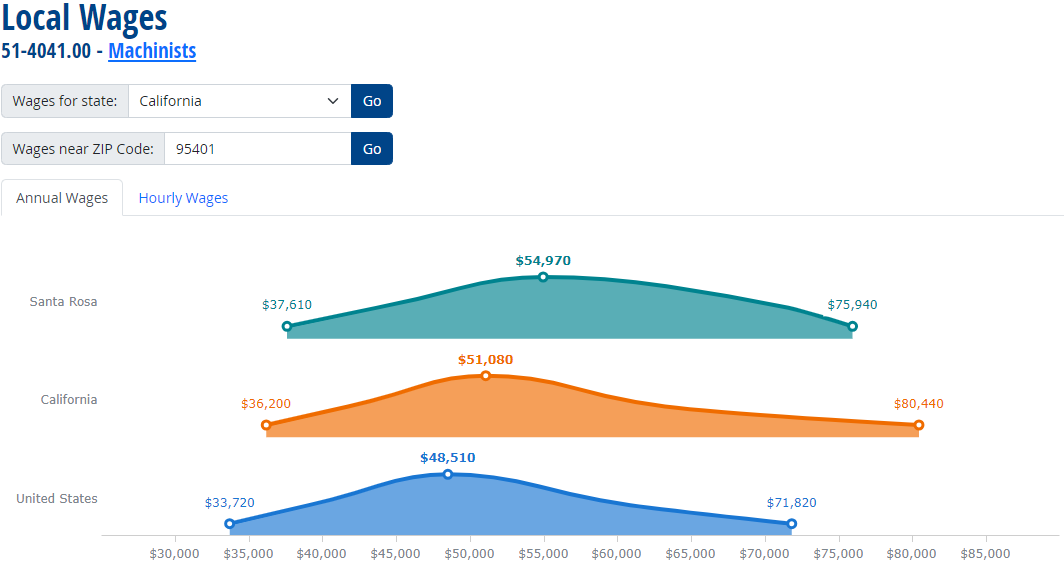AMT Labor Market Information
Occupational Information Network (O*NET)
Machinists
Standard Occupational Classification: 51-4041.00
Job Description: Set up and operate a variety of machine tools to produce precision parts and instruments out of metal. Includes precision instrument makers who fabricate, modify, or repair mechanical instruments. May also fabricate and modify parts to make or repair machine tools or maintain industrial machines, applying knowledge of mechanics, mathematics, metal properties, layout, and machining procedures.
Sample of reported job titles:
- CNC Machinist (Computer Numeric Controlled Machinist)
- CNC Machinist (Computer Numerically Controlled Machinist)
- Gear Machinist
- Machine Repair Person
- Machinist
- Maintenance Machinist
- Manual Lathe Machinist
- Production Machinist
- Tool Room Machinist
Tasks
- Calculate dimensions or tolerances, using instruments, such as micrometers or vernier calipers.
- Machine parts to specifications, using machine tools, such as lathes, milling machines, shapers, or grinders.
- Measure, examine, or test completed units to check for defects and ensure conformance to specifications, using precision instruments, such as micrometers.
- Set up, adjust, or operate basic or specialized machine tools used to perform precision machining operations.
- Program computers or electronic instruments, such as numerically controlled machine tools.
Work Activities
- Controlling Machines and Processes — Using either control mechanisms or direct physical activity to operate machines or processes (not including computers or vehicles).
- Getting Information — Observing, receiving, and otherwise obtaining information from all relevant sources.
- Inspecting Equipment, Structures, or Materials — Inspecting equipment, structures, or materials to identify the cause of errors or other problems or defects.
- Identifying Objects, Actions, and Events — Identifying information by categorizing, estimating, recognizing differences or similarities, and detecting changes in circumstances or events.
- Monitoring Processes, Materials, or Surroundings — Monitoring and reviewing information from materials, events, or the environment, to detect or assess problems.
Skills
- Operation and Control — Controlling operations of equipment or systems.
- Critical Thinking — Using logic and reasoning to identify the strengths and weaknesses of alternative solutions, conclusions, or approaches to problems.
- Monitoring — Monitoring/Assessing performance of yourself, other individuals, or organizations to make improvements or take corrective action.
- Operations Monitoring — Watching gauges, dials, or other indicators to make sure a machine is working properly.
- Active Listening — Giving full attention to what other people are saying, taking time to understand the points being made, asking questions as appropriate, and not interrupting at inappropriate times.
Abilities
- Arm-Hand Steadiness — The ability to keep your hand and arm steady while moving your arm or while holding your arm and hand in one position.
- Finger Dexterity — The ability to make precisely coordinated movements of the fingers of one or both hands to grasp, manipulate, or assemble very small objects.
- Manual Dexterity — The ability to quickly move your hand, your hand together with your arm, or your two hands to grasp, manipulate, or assemble objects.
- Control Precision — The ability to quickly and repeatedly adjust the controls of a machine or a vehicle to exact positions.
- Deductive Reasoning — The ability to apply general rules to specific problems to produce answers that make sense.
Work Styles
- Attention to Detail — Job requires being careful about detail and thorough in completing work tasks.
- Dependability — Job requires being reliable, responsible, and dependable, and fulfilling obligations.
- Independence — Job requires developing one's own ways of doing things, guiding oneself with little or no supervision, and depending on oneself to get things done.
- Analytical Thinking — Job requires analyzing information and using logic to address work-related issues and problems.
- Innovation — Job requires creativity and alternative thinking to develop new ideas for and answers to work-related problems.

